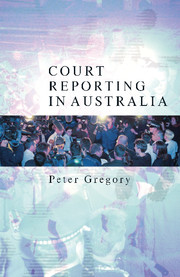Book contents
- Frontmatter
- Contents
- Figures and Tables
- Acknowledgments
- Introduction
- Chapter 1 The Court System: An Overview
- Chapter 2 Gaining Information
- Chapter 3 Contempt
- Chapter 4 Defamation
- Chapter 5 Writing the (Newspaper) Story
- Chapter 6 Subediting and Photography
- Chapter 7 Television and Radio
- Chapter 8 Human Relations and Ethics
- Chapter 9 An Atypical Friday at Court
- Chapter 10 Suppression Orders
- Chapter 11 Future Directions and Issues
- Bibliography
- Index
Chapter 4 - Defamation
Published online by Cambridge University Press: 22 September 2009
- Frontmatter
- Contents
- Figures and Tables
- Acknowledgments
- Introduction
- Chapter 1 The Court System: An Overview
- Chapter 2 Gaining Information
- Chapter 3 Contempt
- Chapter 4 Defamation
- Chapter 5 Writing the (Newspaper) Story
- Chapter 6 Subediting and Photography
- Chapter 7 Television and Radio
- Chapter 8 Human Relations and Ethics
- Chapter 9 An Atypical Friday at Court
- Chapter 10 Suppression Orders
- Chapter 11 Future Directions and Issues
- Bibliography
- Index
Summary
A father sues after a newspaper reports that he, not his son, is facing trial over a robbery. Another publication faces a $2.5 million damages award after it publishes defamatory material from a leaked affidavit that was not read in open court. An article critical of a magistrate is criticised by an appeal court for failing to fairly and accurately report the facts. The piece costs $246 500 in damages and many thousands of dollars in legal fees.
It is correct, as a former colleague suggested, that court reporters face many more concerns about contempt of court than they do about defamation. They are also more likely to be covering defamation cases than appearing in them. A State premier, policemen, broadcasters, businesspeople, lawyers, doctors, sportspeople, newspapers and an actor have been some of the parties in defamation cases in my experience. A fair and accurate report of court proceedings, as we have discussed, carries a qualified privilege against being sued for publishing defamatory evidence or statements that are made in legal proceedings. The authors of the statements receive an absolute privilege to make them in open court, so that the pursuit of justice is not shackled.
Defamation law lets individuals and companies take action to redress damage to their reputations. Material is said to be defamatory if imputations, or meanings, that are found in it, including inferences, injure the reputation.
- Type
- Chapter
- Information
- Court Reporting in Australia , pp. 57 - 68Publisher: Cambridge University PressPrint publication year: 2005



